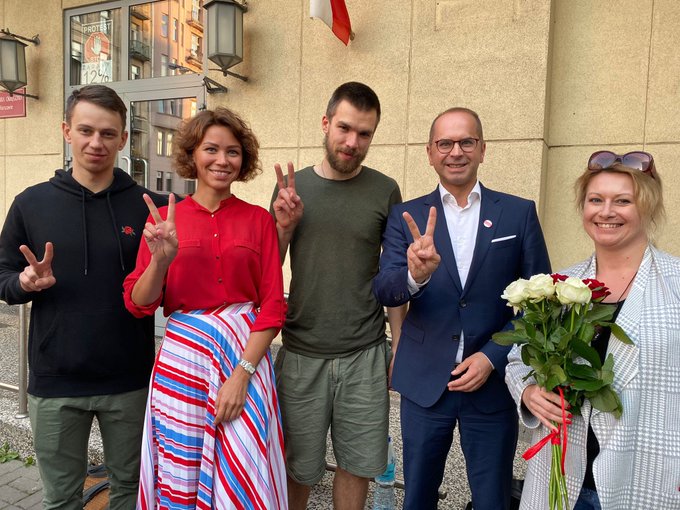A Belarusian activist who was detained near Warsaw on the basis of a request by Minsk has now been released with the help of Polish politicians and journalists. Poland’s interior minister has accused Belarus of using Interpol arrest notices to pursue political opponents abroad.
Makary Malakhouski has been living in Poland on a humanitarian visa, one of many granted by the Polish authorities over the last year to Belarusians fleeing repression amid the unrest that followed last year’s presidential election, at which Alexander Lukashenko claimed victory amid widespread evidence of vote rigging.
The student had participated in protests in Minsk. He then fled criminal charges to Ukraine, and next to Poland, where he has received a scholarship to begin studies at the Catholic University of Lublin in October.
Yet he also remained listed by Interpol, the organisation facilitating worldwide police cooperation, as a wanted fugitive, on the basis of an application by the Belarusian regime. As a result, Polish police detained him on Sunday.
According to an account by the journalist’s partner, police entered their home over a complaint from a neighbour about loud music. They were then asked to present identity documents and Malakhouski was detained.
Warsaw Metropolitan Police said that its role was not to “analyse the legitimacy and reasons” for Interpol red notices, but to “fulfil its tasks”. Such notices are issued as a request to law enforcement to “locate and provisionally arrest a person pending extradition, surrender, or similar legal action”.
In response, interior minister Mariusz Kamiński wrote that the detention was “another political attempt” to exploit the Interpol mechanism. In July, the Polish minister had already called on the organisation to “verify data entered into its databases”, which he said was being abused by countries including Russia.
Stanowczo sprzeciwiam się wykorzystywaniu tzw. czerwonej noty Interpolu w celach politycznych przez niektóre państwa, a szczególności Federację Rosyjską. W związku z tym skierowałem list do prezesa i sekretarza generalnego @INTERPOL_HQ https://t.co/9j3AWCQN17
— Mariusz Kamiński (@Kaminski_M_) July 30, 2021
“Recently, the Polish police have noted cases of detentions of persons indicated in the so-called Interpol red notices for criminal offences,” Kamiński wrote to Interpol president Kim Jong Yang. “At the same time, these persons were granted refugee status or submitted applications to the relevant authorities in Poland for international protection.”
Earlier this year, Polish police detained human rights defender Yevgeny Khasoyev, head of the Buryat branch of the human rights organization Siberia Without Torture, based on a similar Interpol notice at the request of Russia. He was released after two days.
Malakhouski was likewise quickly released following yesterday’s detention. Aleś Zarembiuk, head of the Belarusian House charity in Warsaw, tweeted thanks to Kamiński – as well as opposition MPs Robert Tyszkiewicz and Michał Szczerba – for their “quick response” and “effective joint actions”.
Makary jest na wolności! Interwencja zakończona pomyślenie. Dziękuję @KancelariaABz @Hanna_Machinska i @BelaruskiDom. Apeluję do władz o ograniczone zaufanie do czerwonych not Interpolu i weryfikację tych publikowanych przez reżim. Białorusini muszą czuć się bezpiecznie w Polsce! pic.twitter.com/yLvG4xS0q6
— Michał Szczerba (@MichalSzczerba) September 13, 2021
“It was quickly confirmed that the inclusion…on the Interpol wanted list was an act of the criminal regime of Lukashenka, and the charges against [Malakhouski] are purely political,” said Szczerba, quoted by Gazeta Wyborcza.
The MP warned that there were 10,000-12,000 people with humanitarian visas in Poland who could also be reported by Belarus as wanted if procedures are not better verified.
Zarembiuk told the Polish Press Agency (PAP) that he worried about the “chilling effect” the incident would have on the Belarusian community in Poland. He said there was a risk of creating an impression that Belarusians are “no longer safe” in Poland and that “Lukashenka’s services are able to catch enemies even here”.
Poland has extended various forms of aid and protection to Belarusians fleeing their home country, including funding for NGOs, scholarships for students, and a programme to help Belarusian professionals and businesses seeking to move to Poland. It has given asylum to hundreds of Belarusian refugees.
The Polish government has also given strong backing to the Belarusian democratic opposition, whose exiled leader Sviatlana Tsikhanouskaya has made two visits to Warsaw to meet with Poland’s prime minister.
The Belarusian authorities and their Russian allies have in response criticised Warsaw for, in the words of the Kremlin, “openly interfering in the domestic affairs of Belarus” in violation of the “universally accepted norms of international law”.
Main image credit: Michał Szczerba/Twitter

Maria Wilczek is deputy editor of Notes from Poland. She is a regular writer for The Times, The Economist and Al Jazeera English, and has also featured in Foreign Policy, Politico Europe, The Spectator and Gazeta Wyborcza.




















